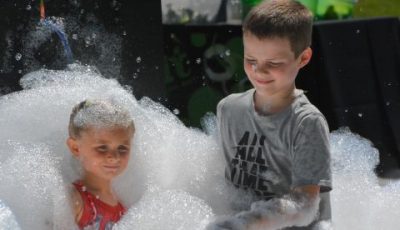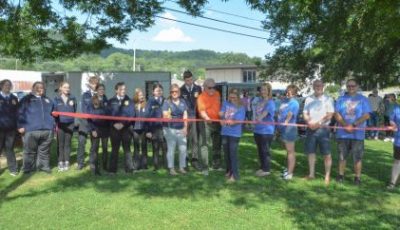W’burg students have fun while learning about healthy life choices

The Donate Life Kentucky State Team traveled to Williamsburg Independent School Thursday morning to help teach fourth and fifth graders about making healthy life choices, and about the merits of being organ donors. Parent volunteer Larry West helps students learn about where various organs are located in the human body.
How does too much salt and fat in one’s food and too little exercise affect the body? What happens to your lungs when you smoke?
Fourth and fifth graders at Williamsburg Independent School got answers to these kinds of questions and got to see how the lungs inflate and deflate as we breathe and how the muscles of the heart actually work during a presentation Thursday in the J.B. Mountjoy Gymnasium.
The Donate Life Kentucky State Team brought the “Life is Cool” program to the school, which is a hands on, in house field trip of sorts that helps students better understand how healthy choices keep one’s body healthy.
“This is a curriculum that is written for fourth and fifth grade students. It is to teach the students about making healthy choices,” said Life is Cool Program Coordinator Charlotte Wong.
“We make healthy choices every day in our life without even thinking about it. For example, when go to McDonalds or Hardees and we order chicken nuggets and French-fries. What other choices are we making. We are choosing to add additional fat not only to our blood but also to our arteries. We are building a risk for heart disease.”
Another health related choice that the program is teaching students about is drinking Coke or Pepsi with a meal.
“We are adding something to our bodies that can add a health complication,” Wong noted. “Right now in the state of Kentucky more than 70 percent of our population has kidney disease and diabetes. A kidney patient, who is going to dialysis, can only have a limited amount of liquid. We don’t want them having a Coke because the additives of the coloring bogs down the kidney.”
If you are a kidney patient or someone with a family history of kidney disease, then you never want to drink anything that isn’t clear enough to see through, Wong said.
“We are not teaching them don’t ever drink a soft drink. We are teaching them think about your kidneys,” she added. “If you have to order a soft drink, let’s make it 7-Up. You can see through it. There is no coloring or anything that is going to affect your life 20 years or 40 years from now.”
The curriculum includes five weeks of lessons in the classroom and is followed by an in house demonstration of ten stations that show how organs, tissues and eyes benefit by choosing a healthy lifestyle at an early age.
Each station concentrates on a specific bodily function, and some stations include pig organs to provide a visual of how the body’s systems work, such as seeing the lungs inflate and deflate as we breathe, and how the heart muscles actually work.
At many stations, students got to put on gloves and actually touch the organs.
University of the Cumberlands students staffed the stations and provided the instruction to the students.
Members of The Donate Life Kentucky State Team were also present in addition to volunteers to help students understand the importance of staying healthy.
The Donate Life Kentucky State Team is dedicated to saving lives through organ and tissue donation and transplantation. Life is Cool is one of its’ initiatives to help people better understand how lives are saved through the generosity of one individual and how people that need transplants receive them.
Students and teachers learned through the program about organ and tissue donation and transplantation, and the importance of the donor registry when people need a transplant. One person can save eight lives and help up to 50 more people through organ donation.
“Organ donation is a possibility that is brought up in every hospital in the state of Kentucky when a patient is declared brain dead,” Wong noted. “Why do we wait to have that conversation on a family’s darkest, most terrible day?”
Wong said the program talks to students in fourth grade about organ donation so it isn’t a new topic when they get to be teenagers and older. The curriculum includes free workbooks for the schools that students take home to complete with their parents.
“It is a good way for parents to interact with the teachers and the students. We are opening conversation. They are talking about something that generations older than myself have always considered taboo,” Wong added. “We are opening the doors for communication.”








